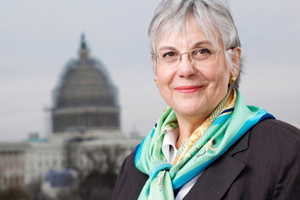The WiMN’s Front and Center is a weekly column that showcases accomplished women who work in the music and audio industries. We spotlight successful female performers, manufacturers, retailers, educators, managers, publicists, and everyone else in between. Want to be featured? Learn how here.
Front and Center: NAMM Director of Public Affairs & NAMM Foundation Executive Director, Mary Luehrsen
 We are honored to feature today’s Front & Center subject and 2016 She Rocks Award recipient, Mary Luehrsen.
We are honored to feature today’s Front & Center subject and 2016 She Rocks Award recipient, Mary Luehrsen.
A senior executive with NAMM, Luehrsen oversees the organization’s federal level policy development and government relations efforts around issues affecting access to music education and global commerce in the music industry.
She also serves as executive director of the NAMM Foundation, a supporting organization of NAMM that supports music research, philanthropic, public service programs and leads national advocacy efforts for music education.
Luehrsen was a professional flutist for 20 years specializing in chamber and contemporary classical music. As a certified music educator, she taught elementary general and instrumental music for 16 years.
To find out more about Mary Luehrsen’s work, visit namm.org and nammfoundation.org.
WiMN: What are some of the challenges you face overseeing NAMM’s federal level policy development and government relations efforts? How do you overcome them?
ML: Over the years of targeted advocacy for music education, we have educated elected officials about the value of music education. It is not unusual to go into an office of a Member of Congress and have him or her and the staffers quote to what the research tells us about music education – much of the research that is cited has been funded by NAMM. So the facts are out there and working about the value of music education and research reinforces core beliefs about its important role in education.
However, it is a continual challenge to get these same folks who say they believe in music education to actually DO something and this is true on all levels of policy and advocacy from federal government to local school districts. We have to clearly articulate what we want in terms of policy and funding and we have to stay at this until we keep moving access and opportunity forward.
WiMN: With music programs diminishing in schools, what can folks on the ground level do to keep music education a part of their community and schools?
ML: First of all, I’m not sure that the phrase “music programs diminishing in the schools” is accurate, or at least, I’m not comfortable using that phrase universally. Data (we have some national data, but not enough!) tells us that music education is offered in a vast number of schools, but the type and quality of learning is a concern. And we know that where strong music education traditions have been established, these programs have a way of being strong for decades and that comprehensive music education programs are more likely to be found in suburban – “affluent” – communities as compared to urban schools.
An accurate phrase could be that music education opportunity is at best patchy, and is NOT universal and what we are working for, truly, is access and opportunity for all students to receive a high quality music education, taught by certified teachers as part of the school curriculum.
Our advocacy efforts focus on the grassroots level via our SupportMusic Coalition. Parents, teachers, school administrators and community leaders can and do come together to form local coalitions to re-instated and build music education programs and it takes shared and sustained commitment to build true standards-based music education programs in schools. And I must tell you, some remarkable re-instatement and program build outs are occurring throughout the country – we just have to keep cheerleading and celebrate and model advocacy efforts from one community to the next.
WiMN: Can you describe a typical work day?
ML: Oh my, I basically multi-task all day long. A real luxury is to actually be in my office all day, make a list very early and by the end, see these crazy scratches and notes all over the page. Then I take that page and re-write it to be the list for the next day though I may be working from a train or plane (I’m on a train right now!).
I schedule phone calls – and sometimes I have calls, including web-based meetings each hour of the day – begs the question – when does real work get done? And finally, I facilitate between task-oriented work (writing a magazine article, reviewing podcast scripts) to big picture and management stuff. Sometimes, I just get dizzy and jump on my bike and ride to the drop stuff off at the post office. I bet every woman you interview tells you her day is sort of like this – we are born multi-taskers, I think.
WiMN: Are you a musician? If so, what do you play?
ML: I was a professional flutist for 20 years – all my degrees are in music. I had an active solo and chamber music ensemble career – those were wonderful years, but there was a part of my brain that was crying out to do other things and I listened. Now I play the ukulele for fun, and am very serious live music listener!
WiMN: What is a little-known fact about you?
ML: I have running lights on my pedal kayak so I can stay out on Long Island Sound past sunset – makes me weep just thinking about it.
WiMN: Have you ever faced adversity in the music industry simply for being a woman? If so, how did you overcome it?
ML: I’ve been a professional working woman for a lot of years and in this industry – and others – I think adversity is just part of job and career growth, for both men and women.
There is a great deal to learn as one comes up in the working world – I see this with my precious daughter now who is just starting out her career. I think some old fashioned attitudes exist, and I have found it wisest to not ignore this reality, when encountered, and assess with both feet on the ground if these attitudes are going to inhibit my own develop and ambitions. I guess it’s fair to say that the scale of adversity is possibly measured by one’s reaction to it.
WiMN: Do you have advice for young women who might be considering a career in the music industry?
ML: Land a job with people you think you will get along with and will help you be successful from day one in your job. Move on from any job if you find yourself not being identified as someone who is sincere and making a contribution and remember, a job is called WORK for reason – sometimes you just have to dig in and work hard, show solid results and then move on to make the next contribution.
WiMN: What does it mean to you to receive a She Rocks Award?
ML: This is a wonderful award and I’m so honored to be included in the group of other woman who have received it in the past and are receiving it this year. It is just nice – like warms my heart – to know that my efforts are recognized. And the news of the award came on a day when I was dizzy with multi-tasking – too busy to take a bike ride – so it was like a pat on the back. I am very grateful.






